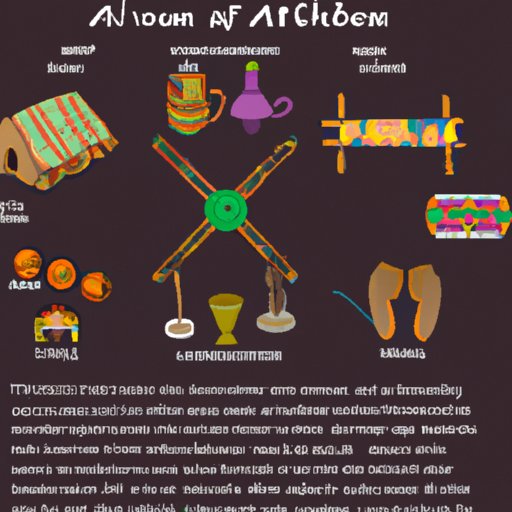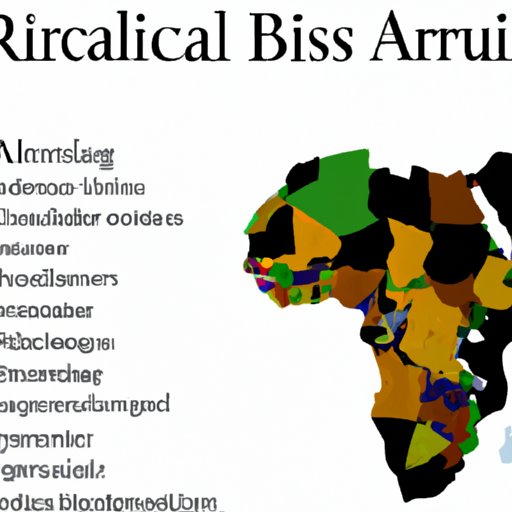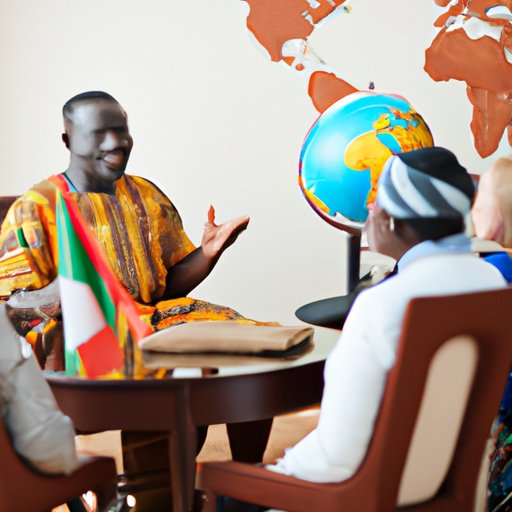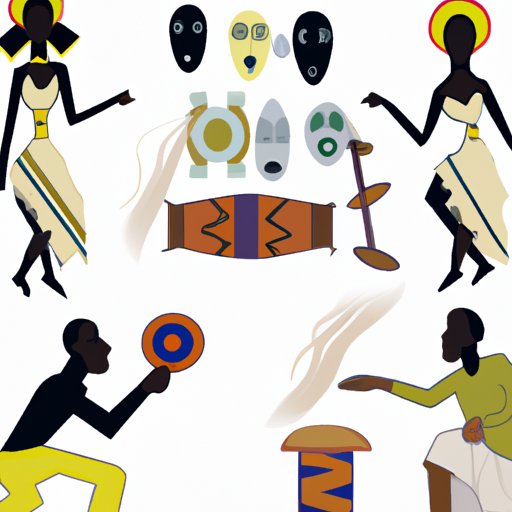Introduction
Africa is a vast continent with a rich history and deeply embedded cultural traditions. From its vibrant music and art to its unique religious ceremonies, African culture has long captivated the attention of people around the world. In this article, we explore the various aspects of African culture, from the traditional beliefs and practices of indigenous communities to the influence of colonialism on African societies.
Exploring Unique Cultural Traditions of African Nations
When discussing African culture, it is important to recognize the immense diversity among the many nations of the continent. Each country has its own distinct customs, beliefs, and practices, which have been shaped by the region’s history and geography. For example, in West Africa, many communities are rooted in animism, while in East Africa, Islam dominates. Additionally, there are numerous languages spoken across the continent, from Swahili in East Africa to Yoruba in West Africa.
Despite the regional differences between African nations, there are some shared cultural traits. For instance, many African cultures place great importance on hospitality, respect for elders, and communal living. These values are often reflected in the traditional art, music, and dance of African countries.
Examining the Role of Music, Art, and Dance in African Culture
Music, art, and dance are integral parts of African culture. Many African countries have their own distinct musical genres, such as highlife in Ghana or mbaqanga in South Africa. These styles often incorporate traditional instruments like drums, xylophones, and guitars. Additionally, African music has had a major influence on global trends, from jazz and hip-hop to reggae and pop.
African art is also highly distinctive, featuring bold colors and intricate designs. The artwork of certain regions, such as the Ashanti people of Ghana, is particularly renowned. African art is often used to tell stories or convey spiritual messages. Similarly, African dance is often performed to celebrate important occasions or to honor ancestors. Traditional dances vary greatly from country to country, but they typically involve intense physical movements and rhythmic clapping.
Investigating the Impact of Colonialism on African Cultures
Colonialism has had a profound impact on African culture. During the 19th century, European powers established colonies throughout the continent, bringing with them their own political and social systems. This led to the displacement of native populations and the destruction of traditional customs and beliefs. As a result, many African societies were forced to adapt to foreign influences.
In addition, colonialism caused a period of economic decline in Africa, as resources were exploited and local industries destroyed. This led to further cultural erosion, as the continent struggled to rebuild its economy and regain its autonomy. Despite this, many African nations have managed to retain their unique cultural identities, despite centuries of colonization.
Understanding Gender Roles in African Societies
Gender roles play an important role in African culture. In many traditional African societies, men are seen as the breadwinners, while women are expected to take care of the home and family. Additionally, women are often expected to obey their husbands and follow certain codes of behavior. However, in recent years, there has been a shift in attitudes towards gender roles, with more African women entering the workforce and pursuing careers.
Despite this, gender inequality remains a major issue in many African countries. Women are often denied access to education and economic opportunities, and they face discrimination in the workplace. Additionally, domestic violence and sexual assault are still common occurrences in many African nations. Thus, it is essential that African societies continue to work towards greater gender equality and respect for women’s rights.

Describing the Rituals and Ceremonies of African Religions
Religion is an integral part of African culture. The continent is home to a variety of faiths, including Christianity, Islam, and traditional African religions. Each faith has its own set of rituals and ceremonies, which are often tied to the natural environment. For instance, in some traditional African religions, offerings are made to rivers or mountains as part of spiritual ceremonies.
Many of these religious rituals are still practiced today, although some have been adapted to suit modern lifestyles. For example, in some Christian churches, traditional African drumming and dancing are used to accompany hymns. These adaptations demonstrate the resilience of African culture, even in the face of outside influences.

Analyzing the Influence of African Cuisine on Global Food Trends
African cuisine is renowned for its flavor and complexity. Dishes like jollof rice, egusi soup, and suya kebabs are popular across the continent, and they have become increasingly popular in other parts of the world. Additionally, African chefs have embraced fusion cuisine, combining traditional ingredients with modern cooking techniques to create unique dishes.
As African cuisine continues to gain popularity globally, it is important to recognize the unique cultural influences behind each dish. From the use of indigenous ingredients to the symbolic meanings behind certain recipes, African cuisine reflects the continent’s rich history and cultural diversity.

Discussing the Contribution of African Cultural Practices to Global Understanding
The cultural practices of African nations have much to offer the world. From music and art to cuisine and religion, African culture has the potential to enrich global understanding and promote intercultural exchange. By recognizing and celebrating the unique traditions of African nations, we can create a more tolerant and inclusive society.
Moreover, African culture is an invaluable source of inspiration for artists, writers, and filmmakers. Through their works, they can bring African stories to life, highlighting the vibrant cultures of the continent and helping to bridge cultural divides.
Conclusion
In conclusion, African culture is incredibly diverse and complex. From its traditional beliefs and practices to its art, music, and cuisine, African culture has much to offer the world. Moreover, it is essential that we understand the impact of colonialism on African societies and strive for greater gender equality. Finally, by recognizing and celebrating the unique traditions of African nations, we can create a more tolerant and inclusive society.
(Note: Is this article not meeting your expectations? Do you have knowledge or insights to share? Unlock new opportunities and expand your reach by joining our authors team. Click Registration to join us and share your expertise with our readers.)
